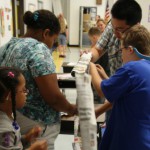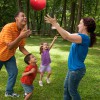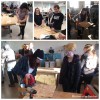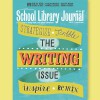 Looking for an activity to engage your students in the interview process, writing, and even multimedia production? Check out On Coming to America: Small Moments, Big Meanings, including online lessons with structured opportunities for students to listen to, learn from, and honor the stories of others and, in the process, document and celebrate small moments in history from their own communities and across the globe.
Looking for an activity to engage your students in the interview process, writing, and even multimedia production? Check out On Coming to America: Small Moments, Big Meanings, including online lessons with structured opportunities for students to listen to, learn from, and honor the stories of others and, in the process, document and celebrate small moments in history from their own communities and across the globe.
Category Archives: Article/Blog Spotlight
What Changes When a School Embraces Mindfulness?
 “The program is a blend of neuroscience, social and emotional tenets like empathy and perspective taking, and mindfulness …”
“The program is a blend of neuroscience, social and emotional tenets like empathy and perspective taking, and mindfulness …”
Regarding her K-8 Title I school’s experience with implementation, principal Lana Penley shared, “We’ve seen this huge shift in the overall tone and civility of the school culture.”
Keep reading in MindShift »
What Kids Should Know About Their Own Brains
 “Neuroscience may seem like an advanced subject of study, perhaps best reserved for college or even graduate school. Two researchers from Temple University in Philadelphia propose that it be taught earlier, however—much earlier. As in first grade.” Keep reading in MindShift »
“Neuroscience may seem like an advanced subject of study, perhaps best reserved for college or even graduate school. Two researchers from Temple University in Philadelphia propose that it be taught earlier, however—much earlier. As in first grade.” Keep reading in MindShift »
What Superintendent Moran has to say: Understanding how the brain learns is critical for educators to select pedagogical practices that support retention of procedural knowledge as well as critical content. In this post, the author provides perspective on what kids should know about their own brains and how that knowledge helps young people learn how to learn, a key mindset. Information in this post fits well with our Lifelong-Learner Competencies, in particular applying habits of mind and metacognitive strategies.
How to Reinvent Project Based Learning to Be More Meaningful
 Project based learning “continues to be misinterpreted as a single teaching strategy rather than as a set of design principles that allow us to introduce the philosophy of inquiry into education in an intelligent and grounded way. It’s plagued by misunderstandings about when it should be used, and when not, and to what extent it can fulfill the mandate of a standards-based system. Too often, it ends with enthusiastic students delivering mediocre work — and teachers aren’t sure what went wrong or right.” Keep reading in MindShift »
Project based learning “continues to be misinterpreted as a single teaching strategy rather than as a set of design principles that allow us to introduce the philosophy of inquiry into education in an intelligent and grounded way. It’s plagued by misunderstandings about when it should be used, and when not, and to what extent it can fulfill the mandate of a standards-based system. Too often, it ends with enthusiastic students delivering mediocre work — and teachers aren’t sure what went wrong or right.” Keep reading in MindShift »
To Help Kids Thrive, Coach Their Parents
 In 1986, in a few of the poorest neighborhoods in Kingston, Jamaica, a team of researchers from the University of the West Indies embarked on an experiment that has done a great deal, over time, to change our thinking about how to help children succeed, especially those living in poverty. Its message: Help children by supporting and coaching their parents. Keep reading in The New York Times »
In 1986, in a few of the poorest neighborhoods in Kingston, Jamaica, a team of researchers from the University of the West Indies embarked on an experiment that has done a great deal, over time, to change our thinking about how to help children succeed, especially those living in poverty. Its message: Help children by supporting and coaching their parents. Keep reading in The New York Times »
The Jamaica experiment helps make the case that if we want to improve children’s opportunities for success, one of the most powerful potential levers for change is not the children themselves, but rather the attitudes, beliefs and behaviors of the adults who surround them.
Trigonometry Miniature Golf
 Cutting wood with a band saw is just plain fun. I have not found a trigonometry student yet who disagrees. This is one of the reasons that I have built the Trigonometry Miniature Golf project into my Trigonometry curriculum. Read more in Mathematics Teacher (MT), an official journal of the National Council of Teachers of Mathematics »
Cutting wood with a band saw is just plain fun. I have not found a trigonometry student yet who disagrees. This is one of the reasons that I have built the Trigonometry Miniature Golf project into my Trigonometry curriculum. Read more in Mathematics Teacher (MT), an official journal of the National Council of Teachers of Mathematics »
Author Tim Hickey is a Nationally Board Certified Teacher and the math department chair at Monticello High School.
Brooklyn Elementary School Creates Test Alternative to Assess Students
 The Brooklyn New School, a progressive lottery-based elementary school in Carroll Gardens, has taken a stance against the state’s standardized math and English tests: Roughly 95 percent of its families opted out this year.
The Brooklyn New School, a progressive lottery-based elementary school in Carroll Gardens, has taken a stance against the state’s standardized math and English tests: Roughly 95 percent of its families opted out this year.
While the school — which is one of the city’s most sought after — has made clear that it opposes standardized tests, it’s now working on clarifying what it supports when it comes to measuring student progress, principal Anna Allanbrook said. Keep reading in DNAinfo »
Therapy Dogs Work Wonders for Struggling Readers
 “Each and every day, librarians try to promote student literacy in positive and personal ways, while at the same time integrate the latest technologies. But what happens when those modern approaches are not enough to motivate students to pick up books? One low-tech, viable option: canine companions!” Keep reading in School Library Journal as library media specialist Mae Craddock and language arts teacher Michelle Harley of Burley Middle School describe the experience (and success!) of using therapy dogs to engage at-risk readers.
“Each and every day, librarians try to promote student literacy in positive and personal ways, while at the same time integrate the latest technologies. But what happens when those modern approaches are not enough to motivate students to pick up books? One low-tech, viable option: canine companions!” Keep reading in School Library Journal as library media specialist Mae Craddock and language arts teacher Michelle Harley of Burley Middle School describe the experience (and success!) of using therapy dogs to engage at-risk readers.
Family Engagement in Early Math Education
 Over the next three weeks, Harvard Family Research Project is focusing on family engagement in early mathematics education within their FINE (Family Involvement Network of Educators) Newsletter. This week, the series, Formula for Success: Engaging Families in Early Math Learning, draws out important lessons for both practitioners and families around engaging families in children’s learning of mathematics anywhere, anytime.
Over the next three weeks, Harvard Family Research Project is focusing on family engagement in early mathematics education within their FINE (Family Involvement Network of Educators) Newsletter. This week, the series, Formula for Success: Engaging Families in Early Math Learning, draws out important lessons for both practitioners and families around engaging families in children’s learning of mathematics anywhere, anytime.
